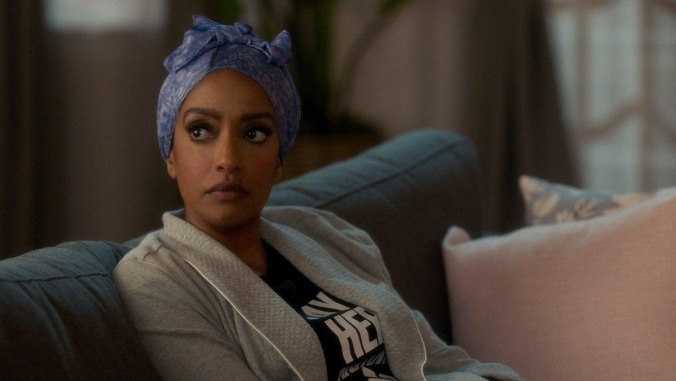The thing is, that message would ring a lot truer
if this season hadn’t dedicated so much time to showing Kara serving as Orlando’s
advocate in such a direct and personal way. If the point of this episode were
to shine a light on the way white allies can be committed to fighting racial
injustice one second only to get distracted by a different social problem the
next, that would be a pointed, timely message. But instead “Blind
Spots” has Kara and Alex experience some moments of racial reckoning
101 that just don’t feel entirely true for where they’re at in the series. I’m all for
highlighting the blind spots and flaws of the Danvers sisters. But in the
scenes where they inelegantly but earnestly express their guilt, confusion, and
desire to help, they feel more like generic white women avatars than the characters
we’ve seen grow and mature in matters of allyship over the past six years.
Indeed, “Blind Spots” is at its best when it leans into the
specificity of its characters, rather than trying to deliver broader social
commentary. Azie Tesfai (who also co-wrote the episode) gets some standout
acting moments as Kelly struggles to keep her usually carefully controlled
emotions in check. You can feel her pain build up each time her small, human
concerns are brushed aside for some big picture superheroing. And she has lovely chemistry
with David Ramsey (who also directed the episode) as John Diggle rounds out his
Arrowverse tour with a stop in National City. While it definitely feels like a
role that was conceived for James and awkwardly grafted onto Dig, “Blind Spots”
finds some nice moments of connection for Kelly and Diggle—from their shared
military backgrounds to their shared experiences with racial trauma. Not to mention their shared experiences working with white superheroes who don’t always listen to their points of view without proof.
Similarly, I always appreciate when Supergirl has J’onn
grapple with his experience as a Martian who’s spent most of his time on Earth
living as a Black man. And having Brainy offer some 31st century perspective
was also a welcome use of the specificity of the show’s setup. (Although, oof,
the idea that things are still bad that far into the future is pretty bleak.) The
moment Andrea explains that what happens in the Heights isn’t newsworthy for
CatCo’s demographic beyond its impact on the city’s traffic is brutal in how
tossed off it is. And the closest this episode comes to finding specificity in
Kara’s story is in the idea that she was more willing to fight for alien rights
back in season four because she felt a personal connection to that
struggle in a way she doesn’t with racism.
As for Kelly’s climatic debut as Guardian, it’s… fine? Or at least on
par with the effects and action of the rest of the season—which is to say, not
particularly impressive. I’m not sure I needed Kelly to become a literal superhero
this late into the show’s run, especially when it could’ve been fascinating
to see her lead the same battle for social justice from a civilian point of
view. But there’s a certain degree of rolling with the punches I’ve learned to
do with that kind of stuff on these CW superhero shows. And at least the scene where Brainy excitedly shows off
his costume ideas is fun. (Although I actually found it harder to accept
that Orlando couldn’t recognize Kelly in a mask than the fact that National City
can’t recognize Kara once she takes her glasses off.)
Still, when I think back on “Blind Spots” the scene I’ll
remember most won’t be Kelly in her Guardian costume deflecting 5th Dimensional
Energy from a rooftop. It’ll be the final sequence where Kelly, in a head
scarf and “Say Her Name” t-shirt, gently guides Alex towards what she needs from
her: Love and support without the expectation that she be able unpack and communicate
everything she’s feeling for the benefit of someone else. Of all the teaching
moments “Blind Spots” tries to deliver, that’s the one that feels most personal,
original, and directly applicable as a communication template for the show’s audience—whether
they’re in Kelly’s shoes or Alex’s.
Stray observations
- Orlando becoming the Height’s next councilman is a great endpoint
for his arc! I hope the show follows through on that idea. Jhaleil Swaby has
been a wonderful addition to the back half of the season.
- It’s subtle, but I like the way this episode positions Nia
as a more naturally intuitive ally than either Alex or Kara—perhaps because she
has her own experience with marginalization. (I also loves when she stops Brainy from
delivering another vegetable PSA to the newly healed hospital patients.)
- The scene of Rankin bribing a fellow councilwoman with
stacks of magic cash felt very Wonder Woman 1984.
- Apparently the DEO desert facility still exists! So I guess destroying
that one building didn’t actually destroy an entire government agency!
- It’s nice that Diggle gives Black Lightning’s Jefferson Pierce a shout-out as
he references the importance of having heroes for the people, not just to the
people.
- I’ll have to leave it to more well-versed Arrowverse/Green Lantern fans to figure out what exactly was going on with Diggle in that department. But Brainy sure gives a knowing look when Dig delivers the line, “Worlds await.”


 Keep scrolling for more great stories from The A.V. Club.
Keep scrolling for more great stories from The A.V. Club.